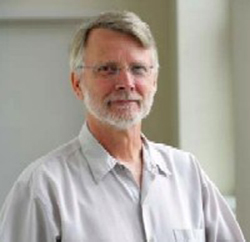
Gordon Logan, Centennial Professor of Psychology, has been elected a foreign associate of the prestigious National Academy of Sciences in recognition of his distinguished and continuing achievements in original research.
Logan is one of 25 foreign associates and 100 new members elected to the NAS this year. Foreign associates are nonvoting members of the academy who hold citizenship outside the United States. Logan is a native of Canada.
“Gordon Logan has made profound theoretical and empirical contributions to the field of psychology through his seminal studies of attention, skill acquisition and executive control,” said Susan R. Wente, provost and vice chancellor for academic affairs. “It is a tremendous honor that the National Academy of Sciences selected one of Vanderbilt’s most eminent faculty members, and we congratulate Gordon as he joins the academy’s esteemed ranks.”
The National Academy of Sciences is a private, nonprofit institution established under a congressional charter signed by President Lincoln in 1863. It recognizes achievement in science by election to membership, and, with the National Academy of Engineering and the National Academy of Medicine, provides science, engineering and health policy advice to the federal government and other organizations.
Membership to the academy is a widely accepted mark of excellence in science. There is no application process, and only members of the NAS may submit formal nominations.
“It is a tremendous honor that the National Academy of Sciences selected one of Vanderbilt’s most eminent faculty members, and we congratulate Gordon as he joins the academy’s esteemed ranks.”
–Susan R. Wente
Logan pioneered the “stop-signal paradigm” that forces an individual to inhibit an ongoing action in response to a stop signal, which has allowed psychologists to learn how people arrest an ongoing behavior. The paradigm has been applied successfully to the study of performance in wide varieties of clinical populations who show deficits in inhibitory control.
Logan’s “instance theory of automatization” also has been extremely influential because it accounts for how people “automate” repetitive cognitive tasks. The theory holds that automatic processing develops because an individual stores separate representations, or “instances,” of each exposure to a task, and this consistent practice increases the speed with which a person can retrieve these instances.
In addition, Logan has shown that the hands of skilled typists know when they make an error, even when the mind does not. He also has collaborated in studies suggesting that the brain controls impulsive behavior in a manner that is substantially different than psychologists have thought for the past 40 years, a discovery that sheds new light on how the brain controls all sorts of basic impulses.
The 2019 electees bring the National Academy of Sciences’ total number of active members to 2,347 and the total number of foreign associates to 487. The NAS’ renowned membership has included Albert Einstein, Robert Oppenheimer, Thomas Edison, Orville Wright and Alexander Graham Bell. More than 180 living academy members have won Nobel Prizes.
Vanderbilt has six other current members of the National Academy of Sciences: Stanley Cohen, Distinguished Professor of Biochemistry, Emeritus; John Exton, professor of molecular physiology and biophysics and professor of pharmacology; Jon Kaas, Gertrude Conaway Vanderbilt Distinguished Chair in Social and Natural Sciences; Vaughan Jones, Distinguished Professor of Mathematics; Larry Bartels, May Werthan Shayne Chair in Public Policy and Social Science; and Randolph Blake, Centennial Professor of Psychology.